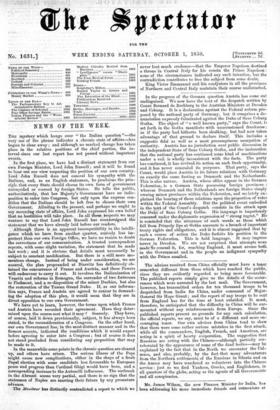- In the progress of the German question Austria has
come out undisguised. We now have the text of the despatch written by Count Bernard de Rechberg to the Austrian Ministers at Dresden and Coburg. It is a declaration against the Federal reform pro- posed by the national party of Germany, but it comprises a de- nunciation expressly fulminated against the Duke of Saxe Coburg Gotha. The object of "a well known party," says the Count, is set forth in the Gotha manifesto with unaccustomed frankness ; as if the party had hitherto been skulking, but had now taken advantage of that ground to 'declare itself. This includes a suggestio falai as well as a most presumptuous usurpation of authority. Austria has no jurisdiction over public discussion in the independent State of Saxe Coburg Gotha, and the insinuation that the national party has 'continued some kind of machinations under a veil is wholly inconsistent with the facts. The party has continued, it has revived its action on each fresh opportunity, and it has never concealed its purposes. That party, says the Count, would place Austria in its future relations with Germany on exactly the same footing as Denmark and the Netherlands. This is also untrue. Austria, whose allies appear in the German Federation, is a German State possessing foreign provinces ; whereas Denmark-and the Netherlands are foreign States simply owning minor provinces within the Federation, and we lately ex- plained -the *bearing of these relations upon the proportion of votes within the Federal Assembly.. But the political event embodied in the tett of the Count's despatch consists in the attack upon the Duli:e. of Saxe Coburg Gotha. His language is imperiously censured under the diplomatic exprission.Of " Strong regret." He is reminded that the- utterance 'of such :words as those which fall-from Princely lipi at-Gotha amounts"to a breach of important
treaty rights and obligations, and it is almost Suggested that by such a course of= action the Duke forfeits his position in the German Federation. This is bold language. It may impress terror in Dresden. We are not surprised that attempts were niadeLto- conceal it, for, reaching England, it must arouse both in the Government and in the people an indignant sympathy with the Prince assailed.


























